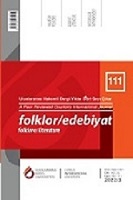Görev Duygusu ve Soy Takıntısı: Murtaza ve Zebercet Tiplerine Karşılaştırmalı Bir Bakış
Sense of Duty and Pedigree Obsession: A Comparative Look at Murtaza and Zebercet
Author(s): Nuriye Ballıkaya, Seyit Battal UğurluSubject(s): Turkish Literature, Sociology of Culture, Sociology of the arts, business, education, Theory of Literature, Sociology of Literature
Published by: Uluslararası Kıbrıs Üniversitesi
Keywords: Murtaza; Homeland Hotel; citizenship; protagonist; ancestry; belonging;
Summary/Abstract: The starting point of this article is to compare a novel chosen from two important writers of the Turkish novel of the Republic period through the protagonists. While the protagonists of Orhan Kemal's (1914-1970) Murtaza (1952) and Yusuf Atılgan's (1921-1989) Anayurt Oteli (1973) works, they have an obsessive mood about the past while continuing their work is the subject. The main problem of this article is to try to understand the socio-cultural and historical contexts of the dissatisfaction caused by the fact that the role of the protagonist in both novels is doomed to remain unrequited. Here, the main focus is to try to analyze the similar and divergent aspects of the social and social identities of Murtaza and Zebercet, the effect of their memories stuck in the past on their present, and finally the deficient or faulty aspects that are reflected outside with the awareness of duty and responsibility. Although the writing times, scope, and contexts of the two works, the first of which were written with a social realist and the second with modernist sensitivity, are different, the dilemma of belonging and temporality they focus on is a situation that is much more exposed today, since it is one of the main problems of humanity. It seems like the common statement of the two texts is that the absence of class and ethnic 'principle' of Murtaza and Zebercet, which is inherited from the long past, is a legacy that is carried to the future. Another finding of this article is that the job that the two protagonists have or aspire to and the social belonging they represent are condemned to remain outside the category or norm. The fate of the two protagonists in the tragic face of life, dragging them into the vortex of nothingness stands before us as another result. The implicit codes of this otherness, which are not seen in the normal flow of daily life, but can be exposed with all their clarity when experienced with close contact, are deciphered with an analytical, analytical, critical, and comparative approach through the two works mentioned. This article also examines the ancestry obsession behind the existential understanding of the duty responsibility of the protagonist of these two works.
Journal: Folklor/Edebiyat
- Issue Year: 28/2022
- Issue No: 111
- Page Range: 769-790
- Page Count: 22
- Language: Turkish

